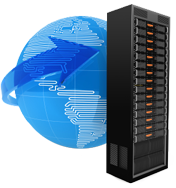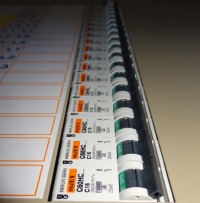What is a data centre?
A data centre is a dedicated room or building specifically for IT infrastructure (network computers systems). Normally the computer systems are on 24x7 and connected to the Internet.
As an example Google has many data centres all around the world hosting it's search engine, your ISP will have space in a data centre as will your bank etc.
The data centre will have a number of systems in place to support the computer systems.
These typically consist of:
What is colocation?
Colocation is hosting your IT systems in a purpose built facility - a data centre. Data Centres are specifically designed to meet the power, cooling, connectivity and security needs of modern IT systems. The higher the data centres tier the more resilient the infrastructure.

The ultimate goal of any colocation data centre is to ensure that your systems are 'always on'.
Why colocation?
By colocating your IT systems you can minimise your chance of suffering costly down time. You gain easy access to very fast, redundant internet connectivity Your servers will be stored in a stable climate controlled environment 24/7, increasing their lifespan. Trained IT engineers are present on site 24/7
For mission critical services colocation is essential, because it can provide guaranteed service levels and unrivalled connectivity.
Choosing a data centre
Choosing the right Data Centre for your needs is important, even to the trained eye it can be hard to tell the difference between one facility and the next.
Hopefully these 10 points will offer you some foresight and help you make an informed decision.
- Location, Location, Location
- Power
- Connectivity - Independence
- Connectivity - quality
- Knowledge and experience
- Tier I, II, III and IV
- Security
- The Basics
- Stability
- Luxuries
1. Location, Location, Location
The importance of location can't be stressed enough. You colocate because you'd 24x7 operation. Ensure your choice of Data Centre is mindfully located.
- Transport links
- Environmental risks (i.e flood, falling tree's etc)
- Industrial risks (i.e nearby hazardous industry)
- Flight paths
- Nearby Road and Rail (At risk from road/rail crash)
- Local crime rate
All small risks but serious concerns when choosing a data centre
2. Power

Data Centre's need lots of reliable power. A UPS can provide limited protection for short outages (<20 mins) and a generator for longer ones.
However these important factors are often overlooked. Do they have enough fuel onsite? How often are these systems tested and checked?
Many generators can only do their full load for 4 hour periods or rely on refuelling contracts which offer no help when there's 30cm of snow on the ground.
3. Connectivity - Independence
By choosing a Carrier Neutral facility if your IP needs exceed that of your IP provider (in either capacity, price, quality or reliability) you can choose another. You can also opt to install your own connectivity. This means you can migrate ISP's without physically moving your servers or connect your office to the Data Centre.
4. Connectivity - Quality
If you're not in a carrier neutral facility you won't have a choice however it's still important to ensure your provider has truly diverse connections.
Many facilities use BT fibre to connect to the regional Tier 1 POP - the BT fibre become the single point of failure.
If they do have redundant connections ensure they're diversely routed
Knowledge and Experience
Many companies have set-up data centres in the recent years looking to profit, even with an unlimited budget only those with both knowledge and experience are able to offer a truly reliable service. Having 2(N+1) is great but only if it's understood, maintained and operated correctly. Ensure your choice have knowledgeable on site staff
Tier I, II, III, IV
The industry recognised Tier's are used to describe the weakest element in a data centre.
Tier I - no redundancy, maybe not even a generator!
Tier II - some redundancy, a but a single failure could affect the IT service, faults and maintenance would mean an impact
Tier III - almost full redundancy, any component can be safely removed for maintenance, a single failure could impact the IT load
Tier IV - Full redundancy, continuous cooling (while the generator starts) no single point of failure at all. Your IT should never be affected
The uptime institute create the Tier's and charge to assess Data Centres, many Data Centre's opt not to be assessed but quote their Tier based on the published standards. We encourage you to ask questions yourself and understand how a significant component failure could impact on the IT load.
Security
How secure is the site? Look at both physical security, location, CCTV, staffing, external lighting, passing traffic, access control and local crime
The Basics
Do they have the basics,
- Generator
- UPS
- Dry Fire Suppression
- 24x7 On site Staff
- 24x7 Access (no charge)
- 24x7 reboots (no charge)
- 24x7 IT staff
- Recorded CCTV
- ISO9001 and 27001
- Access control
Stability
Are they stable? We're talking finances. How long have they been trading, how busy are they, data centre's cost millions to build and aren't profitable when they're empty. Be careful considering a new supplier in a empty facility
Luxuries
Hopefully you should only have to visit your chosen Data Centre every 2-3 years, however if you do have to pull an all nighter or spend 4-5 days there you'll want to consider
- Food, vending machine or cafe
- Build room
- Showers and Toilets
- Local Hotel
- Secure parking
- Free tea and coffee
- Rest area / break room


